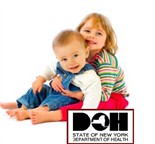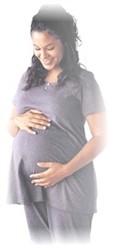July 2009 Volume 25, Number 8
New York State Medicaid Update
Special Edition
The official newsletter of the New York Medicaid Program
David A. Paterson, Governor
State of New York
Richard F. Daines, M.D. Commissioner
New York State Department of Health
Deborah Bachrach, Deputy Commissioner
Office of Health Insurance Programs
New York Medicaid Expands Reimbursement For Blood Lead Testing in Children and Pregnant Women

Effective September 1, 2009, Medicaid, Medicaid Managed Care, and Family Health Plus will reimburse for "point-of-care" blood lead testing of children under age six years and pregnant women when performed by practitioners operating Physician Office Laboratories (POLs) that hold appropriate CLIA certification, and clinics that operate Limited Service Laboratories (LSLs) registered by Wadsworth Center for blood lead analysis. Blood lead testing conducted in these settings will complement blood lead testing using reference methods of higher complexity (e.g., confirmatory analyses) that is reimbursable to permit-holding clinical laboratories.
Recently enacted changes to Public Health Law Section 1370 and implementing regulations at 10 NYCRR Subparts 67-1 and 67-3 authorize the performance of blood lead testing by POLs and hospital off-site clinics and freestanding D&TC's that are registered as LSLs, using devices of complexity appropriate for their level of certification.
These changes also require POLs and LSLs to report blood lead test results to the NYS Department of Health (NYSDOH). These regulation changes recognize the availability of, and encourage access to, blood lead testing using simple, portable "point-of-care" testing technologies, such as the CLIA-waived Lead Care® II. NOTE: all entities that perform blood lead testing must hold the appropriate level of approval to conduct lead testing on human specimens, as determined by NYSDOH's Wadsworth Center.
Why test children and pregnant women for lead?

Childhood lead poisoning remains a serious public health problem. In 2007, nearly 3,600 of New York's children under the age of six were diagnosed with lead poisoning, defined as a confirmed blood lead level greater than or equal to 10 micrograms per deciliter (mcg/dL). Lead poisoning is associated with serious, lifelong adverse effects on children's physical, cognitive, and behavioral development. Routine blood lead testing of young children and pregnant women is essential to assure early identification and coordination of follow-up to prevent further exposure.
Under NYS Public Health Law and regulations, health care providers are required to:
- Test all children for lead at or around age one year and again at or around age two years.
- Assess all children ages six months to six years for lead exposure using a risk assessment tool at least annually, with blood lead testing for children identified as being at risk for lead exposure.
- Assess all pregnant women for lead exposure using a risk assessment tool at the initial prenatal visit, with blood lead testing for women identified as being at risk for lead exposure.
Federal rules also require blood lead testing of all children enrolled in Medicaid at ages one and two years, and for all children ages three to six years who have not had a previous lead test.
"In-office" lead testing
Portable "point-of-care" blood lead testing technology allows health care providers to collect and analyze blood samples for lead in their offices or clinics. Currently, one CLIA-waived blood lead analysis device, marketed under the name LeadCare® II, is FDA-approved. The device can be used to analyze either capillary (fingerstick) or venous samples, with results available in approximately three minutes.
Proper storage and handling of the device, testing supplies and blood samples is essential to assuring accurate results. Guidelines for proper collection of capillary (fingerstick) samples should be closely followed to prevent contamination.
Blood lead test results greater than or equal to 8 micrograms per deciliter (mcg/dL) generated by CLIA-waived devices must be confirmed with an appropriately collected venous sample, analyzed by a clinical laboratory that holds a NYS permit in toxicology-blood lead using another test method. The level of 8 mcg/dL has been established by the NYSDOH to maximize the identification of children with lead poisoning. This level is consistent with the manufacturer's recommendation for the use of a LeadCare® II device to minimize possible false negatives.
Requirements for reporting blood lead test results
Reporting of all blood lead test results to the NYSDOH is essential to assure timely and appropriate follow-up of children, and complete data for public health surveillance purposes. The specific requirements, including the timeframes and mechanisms for reporting, vary by type of laboratory. Detailed information about reporting requirements is available at: http://www.nyhealth.gov/environmental/lead
Requirements for Medicaid reimbursement of point-of-care blood lead testing
- Lead testing is a covered Medicaid service when the provider is following NYS Public Health Law and regulations for blood lead testing of children and pregnant women, and when otherwise clinically indicated.
- The provider must hold CLIA certification issued through the NYSDOH's Physician Office Laboratory Evaluation Program (POLEP), OR be a hospital off-site clinic or free-standing D&TC that is registered as a Limited Service Laboratory with the Clinical Laboratory Evaluation Program.
- A practitioner must be enrolled with Medicaid as a physician office laboratory (POL). A clinic must be enrolled for ordered ambulatory laboratory services.
- The provider's records must document the following to be entitled to reimbursement:
- operation of any CLIA-waived test device is in accordance with both the manufacturer's instructions (the package insert) and standards of laboratory practice as posted at http://www.nyhealth.gov/environmental/lead
- proper procedures for collection of fingerstick blood samples are followed to avoid contamination and otherwise ensure reliable results;
- timely referral is made for confirmation of all blood lead specimens/patients with test results greater than or equal to 8 mcg/dL using a venous sample analyzed by a clinical laboratory that holds a NYS permit in toxicology-blood lead.
- Lead testing can be provided in a POL, provided that it is performed by physicians, nurse practitioners, licensed midwives, or trained employees.
- The provider must comply with requirements for reporting of blood lead test results to the NYSDOH, posted at http//www.nyhealth.gov/environmental/lead
Medicaid Fee-for-Service Billing Instructions
- Lead testing is a billable fee-for-service to Medicaid using CPT-4 procedure code 83655. The maximum reimbursable amount for this procedure code is $15.00.
- Blood lead tests are carved out of Ambulatory Patient Groups (APGs) and must be billed fee-for-service to Medicaid, by the free standing D&TC's and hospital out-patient department clinics, using the ordered ambulatory fee schedule.
Medicaid Managed Care and Family Health Plus Billing Instructions
LSLs and POLs participating with a managed care plan must bill the Medicaid Managed Care or Family Health Plus (FHPlus) plan for in-office lead testing for dates of service on or after September 1, 2009, using CPT-4 procedure code 83655. Reimbursement will be in accordance with agreements between the provider and the health plan.

ADDITIONAL INFORMATION:
Lead Testing and Prevention
For information about lead testing and prevention of childhood lead poisoning contact the NYSDOH Lead Poisoning Prevention Program at (518) 402-5706 or visit the DOH Website at: http://www.nyhealth.gov/environmental/lead
Medicaid Reimbursement
For information on Medicaid reimbursement for lead testing, contact (518) 473-2160. For information on lead testing for Medicaid managed care and FHPlus enrollees, contact (518) 473-0122.
Laboratory Registration and Certification
For information on laboratory registration, CLIA certification for POLs and practice standards, independent practitioners should contact CLIA@health.state.ny.us. or (518) 485-5352 and others should contact CLEP@health.state.ny.us.
Physician Office Laboratory Evaluation Program (POLEP)
For information on POLEP, visit http://www.wadsworth.org/labcert/polep/index.html or call (518) 485-5352. For information on Limited Service Laboratory registration, visit: http://www.wadsworth.org/labcert/clep/Administrative/ChangeForms.htm or call (518) 485-5378.
Physician Office Laboratories (POL)
For information on POL's, please see provider enrollment forms/CLIA information posted at http://www.eMedny.org/info/index.html